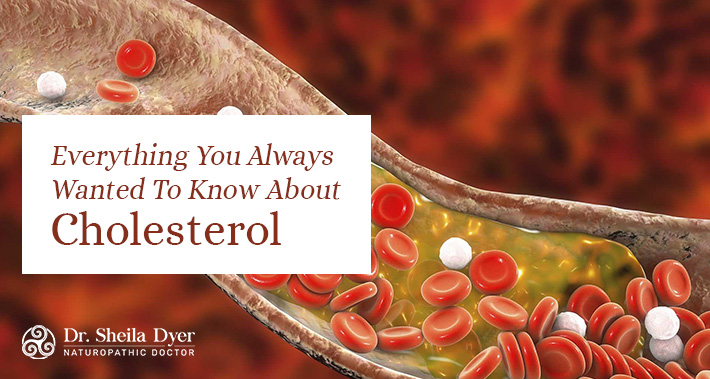
You’ve probably heard cholesterol is bad.
Avoid foods high in cholesterol, take measures to lower your cholesterol.
However, it’s not quite that simple.
There are different types of cholesterol – both bad and good.
I’m Dr. Sheila, a naturopath in Toronto and I want to demystify cholesterol for you, help you understand what the different types of it are, and learn ways to manage it.
Keep reading as we explore this topic in more depth.
What Is Cholesterol?
Cholesterol is a substance which is found in all cells of the body.
It is waxy, and similar to fat.
Although it gets a bad reputation, some cholesterol is required for certain functions such as making hormones, vitamin D, and some materials which help us to digest food.
The cholesterol required for these functions is made by the body, however, it can also be found in animal-based foods.
What Are The Different Types Of Cholesterol?
You may have heard of people referring to “good” cholesterol, and “bad” cholesterol.
There are actually three different types of cholesterol – HDL, LDL, and VLDL – one of these is considered “good”, and the other two are “bad”.
Keep reading to learn what’s what.
HDL
This stands for high-density lipoprotein.
It serves the purpose of carrying cholesterol from the body to the liver.
HDL is considered “good” cholesterol.
LDL
LDL is low-density lipoprotein.
High levels of this cholesterol result in the build-up of plaque in the arteries, and thus this is considered “bad”.
VLDL
The third type of cholesterol is VLDL which stands for very low-density lipoprotein.
It also is considered “bad” cholesterol as it can cause plaque build-up in the arteries, this lipoprotein generally carries triglycerides.
What Causes High Cholesterol?
Lifestyle factors are the biggest contributor to high cholesterol levels.
These include:
- Inactive lifestyle – especially if you sit all day and don’t get enough exercise
- Smoking – along with all of the other health impacts of smoking, it can lower HDL cholesterol and raise LDL cholesterol
- Poor eating habits – including a diet high in “bad fats”.
Additionally, some forms of high cholesterol can be due to genetics, medical conditions and some medications.
Naturopathic Solutions To Lower Cholesterol
There are a number of measures you can take to lower your cholesterol levels naturally.
If you are worried about cholesterol levels here are a few things you can do to take control of your health, and get back on track.
1. Eat Foods High In Monounsaturated Fats And Avoid Trans Fats
Just like there is good and bad cholesterol, you’ve likely heard about good and bad fats – and these impact cholesterol levels.
Firstly, a study in the American Journal of Clinical Nutrition found eating a low-fat diet helped to reduce levels of LDL cholesterol, however, it also causes a reduction in HDL cholesterol.
Another study, from the Canadian Medical Association Journal showed consuming monosaturated fats can increase levels of HDL cholesterol.
Finally, a 2015 study found that trans fatty acids, or “trans fats” increases both total cholesterol levels, and specifically LDL cholesterol levels.
2. Get Active
As was mentioned above, an inactive lifestyle is a large contributor to high cholesterol levels.
A 2013 reviewin the journal Sports Medicine showed physical activity can be used to improve cholesterol levels.
Aerobic exercise such as running or cycling was shown to increase HDL cholesterol levels and lower levels of both LDL cholesterol and triglycerides.
The same review showed resistance training had the effect of both decreasing LDL cholesterol, and lowering body fat.
3. Omega-3
Omega 3 fatty acids are found in foods such as fish, nuts, and flax and chia seeds.
A study in the journal Diabetologia found supplementation with fish oil reduced triglyceride levels in study participants.
It did not, however, appear to have any effect on HDL or LDL levels.
Omega 3 fatty acids can also help with seasonal affective disorder and stress management, among other things.
4. Niacin
Niacin, also known as vitamin B3 is found in foods including chicken breast, ground beef, tuna, turkey, and salmon.
It’s used by the body to convert food to energy and is important for the health of the skin, digestive system, and nervous system.
Taken as a higher dose supplement, it can be used to increase HDL cholesterol levels by 30% or greater.
Niacin supplementation is not without its side effects, so be sure to discuss this option with your doctor or naturopath.
5. Coenzyme Q10
Another supplement you may have heard of is Coenzyme Q10.
Coenzyme Q10 is a compound which helps your cells generate energy.
A 2016 study in the journal Pharmacological Research found Coenzyme Q10 effective for lowering plasma lipoprotein levels.
Book An Appointment With Dr. Sheila Dyer, ND
Are you worried about your cholesterol levels?
Does high cholesterol run in your family, and you want to get ahead of it?
Or perhaps you haven’t always maintained the healthiest diet or lifestyle, but you want to take charge of your health before it’s too late.
I’m Dr. Sheila, a naturopathic doctor in Toronto, Ontario, and I want to help.
I offer a free introductory consultation, in which I answer your questions about naturopathic medicine and show you how it can help you to take control of your health.
Contact me, Dr. Sheila, today to book an appointment.
If you have questions about naturopathic medicine, or would like to start with your first consultation, contact me, and let’s book an appointment.
Dr. Sheila Dyer, ND1080 Dovercourt Rd,
Toronto, ON M6H 2X8
(416) 554-5135
► https://g.page/DrSheilaDyerNd
Dr. Sheila Dyer is a Naturopathic Doctor and a practicing registered nurse offering holistic healthcare with a scientific focus